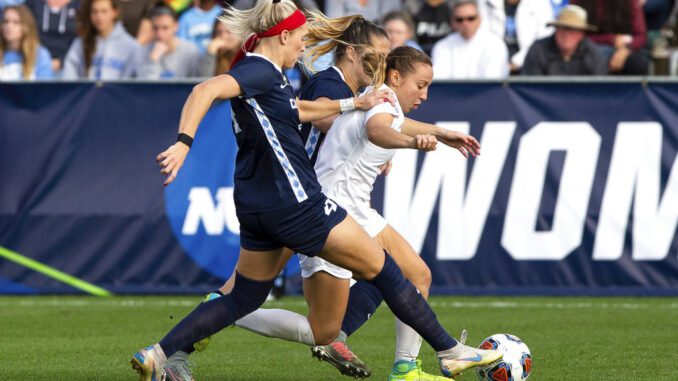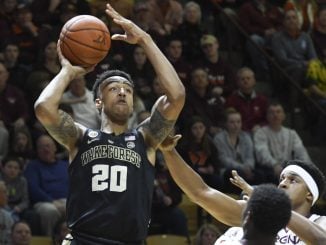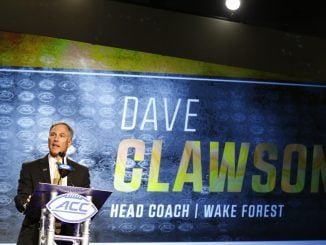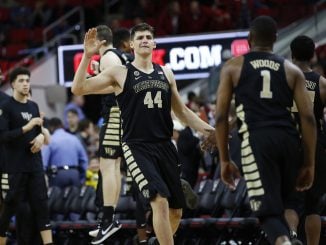
Raleigh missed out on hosting the first two rounds of March Madness when the NCAA decided to move both its men’s and women’s tournaments into centralized bubbles in Indianapolis and San Antonio.
On Thursday, the NCAA offered an olive branch by announcing that its upcoming men’s and women’s soccer tournaments will be held entirely in North Carolina.
The dual events will begin on April 27 with 84 teams playing games at nine sites around the state and culminate with dual College Cups the weekend of May 13-17. It will be the first time the men’s and women’s national championships will be decided on the same day and the same field.
While the soccer tournaments won’t make up for the national exposure lost when men’s basketball was moved out of PNC Arena and the top-seeded NC State women missed the opportunity to host at Reynolds Coliseum, having them in North Carolina is still “a really big deal,” according to one of those responsible for making it happen.
“In terms of national visibility and attention, nothing can replace March Madness,” said Scott Dupree, executive director of the Greater Raleigh Sports Alliance. “But when you’re talking about 84 soccer teams coming to the state and a lot of them spending a whole lot of nights here, economic impact-wise, it’s going to be a huge event very similar to the men’s basketball tournament.”
While the announcement was made last week, the process that brought the two soccer tournaments to the state began as early as November, shortly after the season was moved from its traditional fall schedule to the spring.
North Carolina was chosen because of the NCAA’s long-standing relationship with the Town of Cary and the fact that the championship rounds for both the men and women were already scheduled for WakeMed Soccer Park.
Handling all the logistics necessary to transform the idea into reality was a team effort between Cary venue manager William Davis and his staff, the GRSA, NCFC Youth, NCAA men’s and women’s coordinators Ryan Tressell and Kelly Whitaker, and UNC associate athletic director for event management John Brunner.
In addition to the WakeMed complex, games will also be held at Campbell, East Carolina, UNC Wilmington, UNC Greensboro and Wake Forest, along with Bryan Park in Greensboro, Sportsplex in Matthews and Wilson’s Gillette Athletic Complex.
“The great thing about North Carolina is that you’ve got a ton of great soccer schools down there and a ton of great facilities right in your backyard,” said the NCAA’s Tressell, who knows all about the subject having spent nine years working in the athletic department at High Point University.
“I started by drawing up all the schools within a couple hour radius (of Cary) and began calling to ask about availability. That’s sort of what led us to where we are.”
One venue conspicuously absent from the list, especially since UNC is officially the host institution of both the men’s and women’s tournament, is Fetzer Field in Chapel Hill.
The Tar Heels’ home stadium was unavailable because of a prior commitment to hold the ACC women’s lacrosse tournament there.
“Even though they can’t host any matches, you’d never know it because they’re there, they’re helping, they’re offering resources,” Tressell said, singling out Brunner in particular as an important member of the planning team. “They’ve been a really good partner with us.”
While those organizing the soccer tournaments have learned a lot from watching the ongoing basketball events play out, Dupree said there will inevitably be some unexpected logistical quirks with which to deal.
Not the least of which is the weather.
“The thing that makes soccer harder to do than basketball is that it’s played outdoors,” Dupree said. “In basketball, you’ve got a wooden floor that you put down and you can play on it around the clock, as much as you want. In soccer, you’ve got to deal with outdoor fields and you’ve got to let them rest. So you’ve got to have a lot of fields, which is why we’re using so many venues.”
As was the case with basketball, the decision to move the soccer tournaments to one centralized location was made as a way to minimize travel and condense the time needed to conduct the championships.
It also brings the entire event under one set of COVID rules and protocols.
Although Gov. Roy Cooper has recently relaxed the state’s restrictions on attendance for public events such as the NCAA soccer tournaments, Tressell said that the NCAA plans to limit capacity to 25% at each site.
The easing of Phase 3 restrictions “is good news because it says that things are opening up and getting better,” Tressell said. “We’ll still max out at that 25% because that’s still where we’re at with our protocols.
“Our No. 1 thing is being able to get family and friends in, but our goal is to stream all the games so people will be able to see them one way or the other.”




